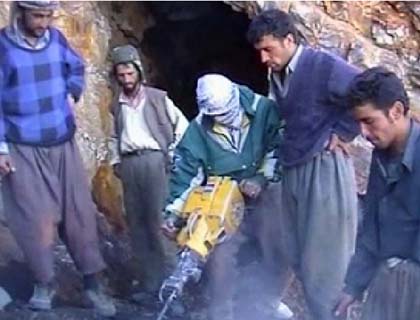KABUL - Experts in natural resources and lawmakers, criticising the contents of a new draft mining law currently being debated in the parliament, said if signed into law, the bill would leave far-reaching negative impacts on the sector.
The existing mining law containing 12 chapters and 105 articles was approved on November 18, 2008 by a joint parliamentary commission before being signed by the president.
After five years, the Ministry of Mines and Petroleum came up with a new draft law due to problems in the already in place law, but the parliament is yet to approve the new measure.
Some civil society organizations and mines’ expert have expressed their concerns over the possibility of signing the draft by the president under pressure from external and internal circles without waiting for the parliament to approve it.
Economists and members of parliament say the drat approval would pave the ground for looting mineral deposits. They note there are multiple shortcomings and deficiencies in the draft such as lack of transparency in bidding process, no clear strategy, trial procedures for government officials supporting specific firms to win biddings.
Javed Noorani, researcher in mining sector at Transparency Watch Foundation of Afghanistan (TWFA), told Pajhwok Afghan News civil society organizations had not been taken into confidence on the draft preparation to ensure transparency in the mining sector.
“Civil society organizations have sent a package of proposals to the president, the ministry of mines, justice and both houses of parliament to reconsider every aspect of the draft. Unfortunately, only the lower house of parliament accepted our proposals,” he added.
Considering the draft in clear contravention to the national interests, he said the measure had many deficiencies and had been prepared by inexperienced people keeping in mind the interests of four or five companies.
He went on to say in case the draft was signed by the president into law then Afghanistan would lose billions of dollars, with influential and mafia groups emerging the winner. In that case, the revenue of mines would end up in the pocket of some individuals not the government.
Mohammad Ibrahim Jaffari, a university professor and member of civil society organization in mine sector, said: “Both the existing law as well as the new draft have problems which need to be resolved professionally. The current draft law has problems hampering foreign and domestic investments. For example, it says exploratory and extraction licenses are separate things.
According to the new draft, if a mining company wants to invest then it should first receive an exploration license after completing the exploratory stage then it should participate in the bidding for getting extraction license which is an obstacle for investment in mining.
“The current mining law paves ground for corruption and illegal procedures in mining sector,” he added.
He suggested unclear parts of the drafted law such as environment, conflicts and disputes, responsibilities of ministry of mine and petroleum, bidding process, external investment and monitoring of mining need regulations.
“The draft is not clear to foreign investors and some articles are even not transparent,” he added. He said the new draft did not encourage rather it hamper foreign investment in the vital sector.
He believed the new draft was not only hampering foreign investment but it had been intentionally prepared to serve the interests of mafia groups.
Mohammad Mirzai, a university professor said, the new draft was weak while the in place law was also imperfect amid many flaws and problems.
Haji Mohammad Abdoh, secretary of judiciary commission of the parliament, said the president should not be forced to sign the draft of mining law and the parliament should work diligently to modify the draft and protect the interests of the nation and country.
Gul Pacha Majidi, deputy for environment and natural resources commission of parliament, informed the parliament had brought changes to some articles of the draft.
The president had no right to sign the draft without thorough debate on its various aspects in the parliament, he said, adding the parliament should make amendments to its clauses by keeping national interests supreme.
Mohammad Ibrahim Adil, former mine and petroleum minister, said the move to replace the old law by the new draft would be a blunder, saying the National Assembly should reject the new draft.
The current mining law was much better than mining laws in Iran, Pakistan, Uzbekistan, Kazakhstan, Turkmenistan, South America and African countries, he said, adding even it was better than those in European countries.
In exclusive interviews, Ibrahim Adel, said a professional team should be tasked to draw comparison between the existing mining law and the draft law in terms of quality of text, extraction conditions and transparency.
“It clearly seems that the draft has been prepared under pressure,” he added.
The new draft was offering ground for foreign influences, with foreign investors would come and extract mines with much lower prices, he noted.
He pointed out the ministry should have hired expert and professional employees in the Ministry of Mines and Petroleum otherwise it was difficult to properly manage the resources.
Mohammad Akbar Barakzai, Minister of Mine and Petroleum, said he would get the new law approved and review that all contracts had been done so far in order to prevent all violations in the ministry. (Pajhwok)

